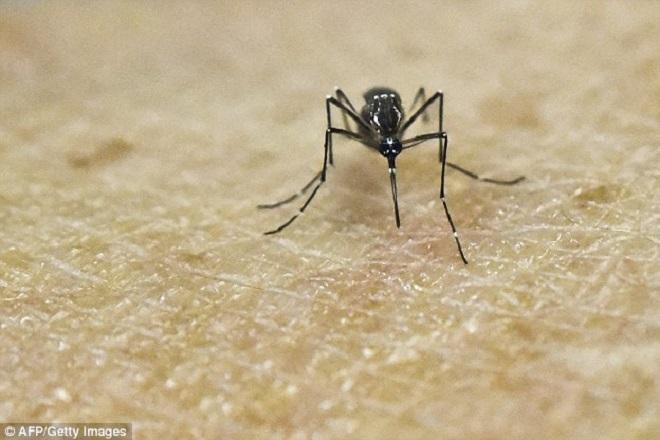The Zika Virus and the dangers to cruising sailors—World Cruising news
by David Schmidt, Sail-World USA Editor on 12 Mar 2016

An Aedes Aegypti mosquito on human skin in a lab in Cali, Colombia. Scientists there are studying the genetics and biology of this mosquito, which transmits the Zika virus SW
For the past months the world has been hearing a lot of news about the Zika virus and its highly suspected links with microcephaly, a birth defect where children are born with significantly smaller heads than healthy infants, and Guillain-Barre syndrome, an autoimmune disease that can lead to paralysis lasting up to several months. As with many tropical diseases, the Zika virus is primarily spread via mosquitos-in this case the “Aedes” species of mosquito, which is also the vector species for dengue fever and the chikungunya viruses-which is typically found in tropical and sub-tropical environs, but which now inhabits all continents save Antarctica.
Up until 2015, however, the virus was known to exist (and occasionally flare-up) in Africa, Southeast Asia and the Pacific Islands, but its appearance in Central and South America represents new and worrisome territory for the disease.
Human blood is one of the Aedes mosquito’s primary food sources, and the mosquitos transmit the disease by stinging an infected human and then inadvertently bringing the disease to their next bite victim. Unlike plenty of other tropical diseases, however, only one in five people who contract Zika exhibit symptoms, which are usually fairly mild and typically involve fevers, rashes, joint pain and/or conjunctivitis.
This presents a big problem for health officials, as eighty-percent of all human hosts do not know that they have the virus, nor do they realize that they are putting other people at risk, especially if Aedes mosquitos are present.
While scientists understand that Zika can be transmitted from a pregnant mother to her unborn infant-and they also suspect that it can be transmitted via bodily fluids-much talk has been focused on the 2016 Rio Olympics and the fact that Brazil is a natural habitat for the Aedes mosquito. Here, the worry is that millions of international visitors, athletes and media will visit Brazil, unknowingly contract the Zika virus and then bring it back to their home countries, fueling a global pandemic.
While this is clearly a danger, cruising sailors who by definition spend a lot of time on boats in unscreened arears can also be at risk-both as potential Zika victims and as unintentional virus reservoirs-as the Zika virus is now found extensively throughout Central and South America, as well as the Caribbean. At the time of this writing, the United States' Center for Disease Control (CDC) listed 26 countries in the Americas where the Zika virus is currently active, as well as three Pacific Island countries and one African island country (Cape Verde).
Most Olympic tourists will be possibly exposed to the Zika virus for the duration of their stay in Rio, but globe-girdling cruising sailors could be in much greater danger, as they tend to stay longer in a given country than a traveler visiting the Games, and they also tend to visit other countries before (eventually) returning to their home waters.
Moreover, the Olympics will be taking place in August during Brazil’s winter, when conditions are cooler, drier and less hospitable to the Aedes mosquito, which lays its eggs in pools of standing water, cruisers tend to visit many of these affected countries year round, thus spiking their odds of exposure and possible infection.
While scientists are working on a vaccine, this process will likely be measured in years, not in months or weeks.
The CDC is currently recommending that pregnant women and women seeking to become pregnant should avoid countries with active Zika outbreaks, including Brazil, Colombia, El Salvador, French Guiana, Guatemala, Haiti, Honduras, Martinique, Mexico, Panama, Paraguay, Suriname, Venezuela, and Puerto Rico. Also, several Central and South American countries-including Ecuador, El Salvador, Jamaica and Colombia-have asked women to avoid becoming pregnant for the next two years.
As scientists battle find a Zika vaccine, other officials are taking steps to try and kill Aedes mosquitos, and to disrupt their breeding cycle by getting rid of standing pools of water. While these are clearly positive steps, globe-trotting cruisers visiting affected countries are strongly advised to follow the CDC’s recommended best practices for avoiding infection, including always wearing long pants and sleeves, using top-quality insect repellents, treating clothing and gear with permethrin, and always sleeping under the protection of mosquito nets.
While these steps should help to reduce exposure, cruisers are advised to consider modifying their itineraries to avoid Zika-infected countries, especially if there are pregnant women-or couples that are seeking to become pregnant-onboard.
And it goes without saying that mosquito screened hatch covers and companion ways will become essential to avoid the night time visitors but on-deck 'Sun-downers' will definitely need to include pre-event latherings of industrial strength insect repellents.
But then the sunsets will still be beautiful....
If you want to link to this article then please use this URL: www.sail-world.com/141984